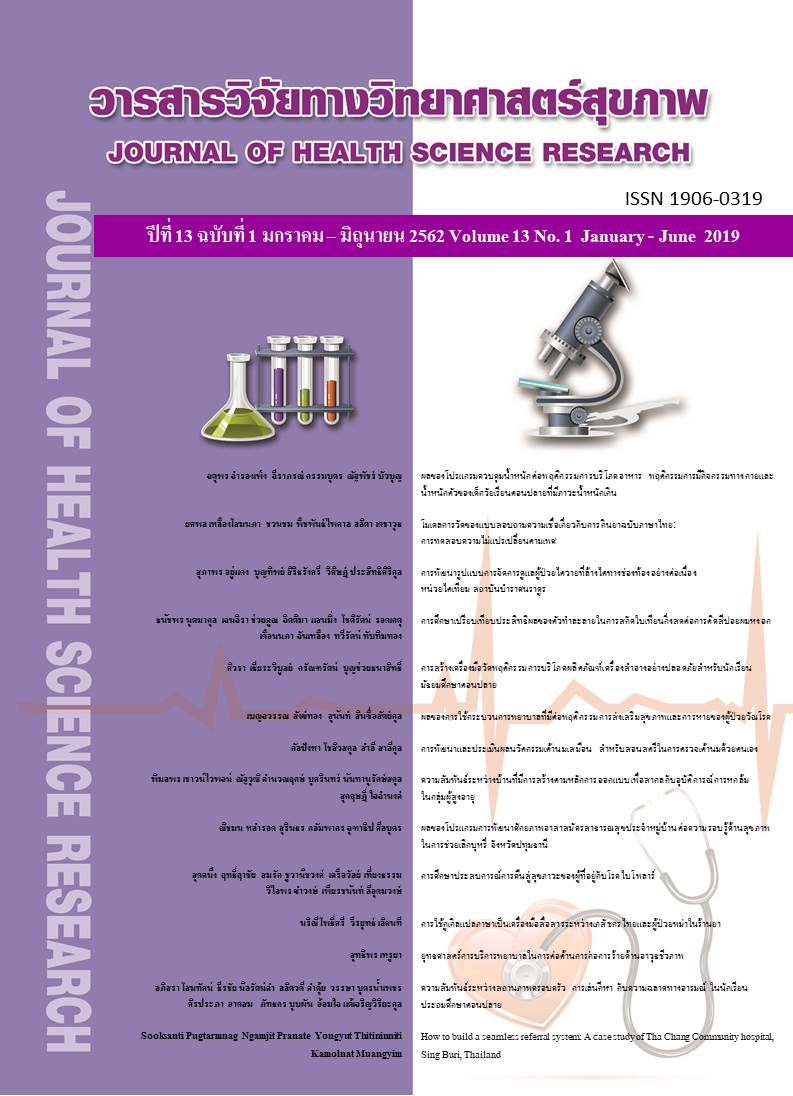ความสัมพันธ์ระหว่างสถานภาพครอบครัว การเล่นกีฬา กับความฉลาด ทางอารมณ์ ในนักเรียนประถมศึกษาตอนปลาย
Main Article Content
บทคัดย่อ
การศึกษาครั้งนี้ มีวัตถุประสงค์ เพื่อศึกษาความสัมพันธ์ระหว่างสถานภาพครอบครัว การเล่นกีฬากับความฉลาดทางอารมณ์ในนักเรียนประถมศึกษาตอนปลาย กลุ่มตัวอย่าง คือ นักเรียนชั้นประถมศึกษาตอนปลาย โรงเรียนคริสตสงเคราะห์ อำเภอองครักษ์ จังหวัดนครนายก จำนวน 208 คน เครื่องมือที่ใช้เป็นแบบสอบถามข้อมูลทั่วไป แบบสอบถามการเล่นกีฬา และ แบบประเมินความฉลาดทางอารมณ์ของเด็กอายุ 6-11 ปี ฉบับย่อ ของกรมสุขภาพจิต ประเมินโดยครูประจำชั้นของนักเรียนชั้นประถมศึกษาตอนปลายที่มีความคุ้นเคยกับเด็ก 6 เดือน วิเคราะห์ข้อมูลด้วยสถิติเชิงพรรณนา และการวิเคราะห์ความสัมพันธ์ด้วยสถิติไคสแควร์
ผลการวิจัย พบว่า นักเรียนที่มีสถานภาพครอบครัวอยู่ด้วยกันและแยกกันอยู่มีความสัมพันธ์กับความฉลาดทางอารมณ์อย่างไม่มีนัยสำคัญทางสถิติ และการเล่นกีฬามีความสัมพันธ์กับความฉลาดทางอารมณ์อย่างมีนัยสำคัญทางสถิติ (p < 0.05)
สรุปผลได้ว่าการเล่นกีฬาเป็นปัจจัยที่สัมพันธ์กับระดับความฉลาดทางอารมณ์ในเด็กนักเรียน แต่สถานภาพครอบครัวไม่มีผลต่อระดับความฉลาดทางอารมณ์ ซึ่งอาจเกิดจากปัจจัยอื่นที่ส่งผลต่อระดับความฉลาดทางอารมณ์
Downloads
Article Details
บทความที่ได้รับการตีพิมพ์เป็นลิขสิทธิ์ของวิทยาลัยพยาบาลบรมราชชนนี จังหวัดนนทบุรี
ข้อความที่ปรากฏในบทความแต่ละเรื่องในวารสารวิชาการเล่มนี้เป็นความคิดเห็นส่วนตัวของผู้เขียนแต่ละท่านไม่เกี่ยวข้องกับวิทยาลัยพยาบาลบรมราชชนนี จังหวัดนนทบุรี และคณาจารย์ท่านอื่น ในวิทยาลัยฯ แต่อย่างใด ความรับผิดชอบองค์ประกอบทั้งหมดของบทความแต่ละเรื่องเป็นของผู้เขียนแต่ละท่าน หากมีความผิดพลาดใด ๆ ผู้เขียนแต่ละท่านจะรับผิดชอบบทความของตนเองแต่ผู้เดียว
เอกสารอ้างอิง
2. Wacharasin C, Khamngoen R, Sriprasan C, Chivanon N. Association between family factors and emotional intelligence of 6-11 year old children. Journal of Health Science Research. 2017;11(1):12-22. (in Thai).
3. Punnitamai V. Emotional quotient (EQ): Indicators for happiness and success of life. Bangkok: Expernet; 2000. (in Thai).
4. Ministry of Social Development and Human Security. Registration of divorce statistic [Internet]. 2016 [cited 2016 Jul 21]; Available from: https://www.m-society.go.th/ewt_ news. php?nid=18789
5. Goleman D. Working with emotional intelligence. New York: Bantam Books; 1998.
6. Noumkomnung B. A comparative of emotional quotient between sport team player and single sport player at Rajamangala University of Technology Lanna Chiang Rai Campus. [Thesis]. Chiang Mai: Chiang Mai University; 2003. (in Thai).
7. Siriprasert J. Physical education and importance in elementary school level. Journal of Education. 1995;10(1):61-82. (in Thai).
8. Piliyapoen T. Necessary and importance of physical education and quality of life development: a manufacturer. Journal of Faculty of Physical Education. 1998;1(1-2):20-3 (in Thai).
9. Srinuan C. Emotional intelligence of grade six students in schools under the jurisdiction of the Office of the Basic Education Commission in Bangkok Metropolis [Thesis]. Bangkok: Chulalongkorn University; 2007. (in Thai).
10. Kuna-apisit V. Importance and necessity of physical education and sport and quality of life. Journal of Exercise & Sport Science. 1997;1(1):1-7. (in Thai).
11. Prayoonkiat K. The effects of physical education learning management in flag football on emotional intelligence of elementary school student base on Goleman’s concept. Online Journal of Education. 2012;7(1):1391-404. (in Thai).


